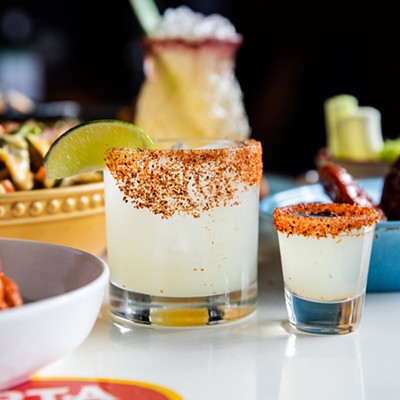How late is too late to order food at a restaurant? That was the thought that plagued me as I sped toward Jeannine's Bistro last week, determined to get in a necessary lunch of moules-frites for a post. The bistro closes for lunch at 2 p.m.; at best, I was going to make it in the door at 1:40 p.m. I recalled my days as a hostess and waitress and felt chagrined.
The latest I like to enter a restaurant prior to its closing is 30 minutes. I feel that this is a reasonable buffer of time for the kitchen to take final orders before breaking down and cleaning up and for your average diner to get through a meal. I would never dream of walking into a restaurant a few minutes before closing -- not just because of the icy glares I'd surely get from the waiters, but also because I remember how tired I was at the end of a long shift, how eager I was to get off my feet and out of clothes that constantly smelled of refried beans.
I felt bad enough entering Jeannine's Bistro at 1:40 p.m. that day, even though the waitstaff was utterly gracious and accommodating the entire time, never once indicating that I was cutting it close or that they wanted to rush me out the door. But that hasn't always been the case at other restaurants.
In an article for Creative Loafing last year, LA Weekly food critic Besha Rodell told a tale of being rushed rudely through her meal after arriving at 10:25 p.m. -- even though the restaurant didn't close until 11 p.m. We've all experienced the same phenomenon: Waiters staring holes through your head while wiping down tables and stacking chairs all around you, eventually slamming the door behind you as you leave.
So how late is too late to darken a restaurant's door?
"If they're not willing to take orders up until closing time (and I agree this is an ambiguous concept, closing time, that is)," says Robert Sietsema, food critic for The Village Voice, "they should do what my laundromat does when it posts a sign that says, 'Last Wash at 7:30.'"
Chimes in fellow food critic Scott Reitz at the Dallas Observer: "Robert's right. Customers shouldn't be expected to guess an arbitrary time that's acceptable for ordering. A customer should be able to walk in and place an order any time within the posted hours. If that's not acceptable, it's on the restaurant to make their expectations clear."
Food writers who've worked in restaurants can't help but see things from the waitstaff's point of view, including Hanna Raskin at the Seattle Weekly: "As an eater," she says, "I have a very different opinion on this matter than I did as a working waitress. Since I have to plan my meals in advance, I rarely run up against a closing time, but agree with our colleagues that a restaurant is obligated to honor whatever's on the door. If a restaurant is open to 9 p.m., someone who shows up at 8:59 p.m. should get the same treatment as the diner who arrived at 5:59 p.m."
However, Raskin contends: "The problem is, diners do a notoriously bad job of handling their restaurant freedoms, such as determining a tip. Same goes for behaving considerately at the tail end of service." And often, it's these same stragglers that leave a completely unacceptable tip for keeping the restaurant open past its posted business hours.
If a restaurant closes for lunch at, say, 2 p.m., sommelier Evan Turner says that the latest he'd expect a customer in the door would be "1:45 p.m., but you had better tip big time." Tipping considerately for keeping the kitchen open is a good rule of thumb, as is calling ahead.
"In my own experience," says Riverfront Times food critic Ian Froeb, "I've found a friendly phone call on the way to a restaurant -- 'Hey, we were thinking of swinging by in x minutes. Could we still order?' -- can improve your odds, especially if you give a definite time frame and specify if you're looking for just appetizers, a meal, the tasting menu (good luck with that) or whatever."
Even if you don't call ahead, however, a good restaurant will serve you anyway.
Says Amanda McGraw, executive chef at River Oaks hotspot Brasserie 19: "I believe you should serve up to 15 minutes past the time posted. Our lunch ends at 3 p.m., but we still serve lunch until 4 p.m. sometimes. Our dinner ends at 10 p.m. on weekdays and 11 p.m. on weekends, but we still serve 30 minutes past closing time often."
She adds: "A pet peeve of mine is walking into a restaurant 20 minutes before closing and the host acts like they are doing me a favor by seating me, so we do the opposite here! We are here to serve. Guests pay our paychecks. I would never want to rush a guest or make anyone feel unwelcome."
Carlos Rodriguez, the executive chef at swanky downtown steakhouse Vic & Anthony's, agrees: "We will keep seating and taking orders after close, basically until there is nobody left to serve. The cutoff only occurs when there are no more orders working in the kitchen. In other words, if a table sits at 10:05 p.m. and orders at 10:15 p.m., and another table shows up while we're still cooking that order, we will seat the new table. We won't turn anyone away, basically, unless we have already shut down the equipment and begun to clean."
"I will say," Rodriguez concedes, "the staff hates it, but I really believe that it breeds goodwill with our guests to know that they are always welcome to come in."
Follow Eating Our Words on Facebook and on Twitter @EatingOurWords





